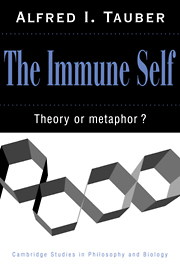Book contents
- Frontmatter
- Contents
- Acknowledgments
- Introduction
- 1 The phagocytosis theory
- 2 The triumph of immunology
- 3 The immune self declared
- 4 From theory to metaphor
- 5 Immunology gropes for its theory
- 6 The self and the phenomenological attitude
- 7 The self as organism: A philosophical consideration
- 8 The search for identity
- Notes
- References
- Index
7 - The self as organism: A philosophical consideration
Published online by Cambridge University Press: 14 January 2010
- Frontmatter
- Contents
- Acknowledgments
- Introduction
- 1 The phagocytosis theory
- 2 The triumph of immunology
- 3 The immune self declared
- 4 From theory to metaphor
- 5 Immunology gropes for its theory
- 6 The self and the phenomenological attitude
- 7 The self as organism: A philosophical consideration
- 8 The search for identity
- Notes
- References
- Index
Summary
THE SHARED VISION OF METCHNIKOFF AND NIETZSCHE
In a profound sense the success of immunology has rested upon the ascendency of its epistemology, and in this view it has been highly successful. The appropriation of the self must be regarded as an important element of that project. But beneath this triumph we can discern a metaphysical issue that we must further explore to truly discern the theoretical underpinnings of this science. The self metaphor depends on its metaphysical moorings to articulate its meaning; thus, despite ample Wittgensteinian warnings to the contrary, I remain committed to exploring these foundations. If epistemology enunciates how we know what we know, metaphysics (in a Whiteheadian [1925] tradition) proposes what there is for us to know. This is the underlying Metchnikovian challenge. Thus far, the inquiry has been oriented around the self, constructed by metaphor and analyzed in epistemological terms. There remain in fact underlying issues that require attention, and it is to these that we now direct our inquiry. Not surprisingly, considering the logic of my argument, we again turn to Metchnikoff. The fundamental basis of Metchnikoff's thinking consists in an understanding of the indeterminateness of organismal integrity, maintained and perpetuated through an ongoing process of self-definition. The self could no longer be clearly delineated as a given entity. The “boundaries ” of the organism are constantly being reestablished under the assault of temporal change and environmental challenge. A comparable pictorial image would be the cubist or fauvist vision of the object fusing into its contextual surroundings and thus blurred in its identity.
- Type
- Chapter
- Information
- The Immune SelfTheory or Metaphor?, pp. 230 - 268Publisher: Cambridge University PressPrint publication year: 1994



